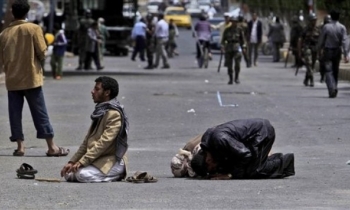We must let journalism rust. As air and sunlight turns old cars and tools an earthy red, oxidization turns tabloids and broadsheets a stale shade of yellow. This hue, "vintage newspaper," is not the prettiest color in the spectrum. But we should not forget what it looks like.
I am not affecting nostalgia here. I am concerned that the computers we so desperately rely on don’t know everything. Google is not an oracle. The archives of Lexis-Nexis began to disintegrate in the 1970s. To the extent that we depend on such ephemeral digital technology to do our remembering, we are bound to forget.
Through an unusual set of circumstances, the crumbling newspaper in my hands had avoided the landfill. Leafing through it, I found most of the stories didn’t matter today, but one word stuck out on the page: billet. It means "lodging for soldiers," or "a job." The word "billet" was not supposed to exist – not, at least, in the lexicon of the Texas Air National Guard during the 1970s and 80s. Yet that was precisely the context of the article, and there, set in type, was the supposed malapropism.
Some weeks earlier, CBS News anchor Dan Rather had narrated a report about President George W. Bush’s preferential treatment during the Vietnam War. Rather’s story was discredited, in part, because it cited documents that contained the word "billet," which, according to some people from Bush’s old unit, was not the appropriate terminology.
"Officer [Bush] has made no attempt to meet his training certification or flight physical," read one of the memos ostensibly written by Bush’s supervisor. "Officer expresses desire to transfer out of state including assignment to non-flying billets."
Before the CBS report was even finished, writers on the Internet began calling the memos forgeries. The professional press vigorously chased the allegations: The terminology wasn’t right, the typography appeared computer-generated, the formatting was improper, and so on. For someone on a daily deadline, it was almost impossible to absorb all the minute detail and specialized knowledge contained in the online debates. Investigating the CBS memos, I found that some of the arguments against their authenticity weren’t as clear-cut as they seemed. But the allegations themselves were enough to keep the story moving fast, and less than two weeks after the original report, Dan Rather apologized for airing a story that CBS couldn’t confirm. Still, no one has proven the documents to be real or fake.
At first I didn’t pay much attention to the scandal that came to be known as "Rathergate". I didn’t care whether Bush skipped Vietnam. But by chance, I found a lead that I hoped would take me to the source of the documents that brought so much trouble to CBS. I assumed they were forged; I suspected it was a set up. My editors sent me to Texas in late October 2004, more than a month after the infamous "60 Minutes Wednesday" report aired.
The lead didn’t pan out. But the more I drove around the state knocking on doors, and the deeper I peered into what more than one reporter called the "rabbit hole" of Bush’s time in the National Guard, the more absurd the coverage of the CBS scandal came to look. I had these yellowed papers – I had "billet," the word that didn’t exist.
There were veterans who corroborated the substance of the CBS memos, if not their authenticity. I talked to Dean Roome at his dusty antique shop. He was one of Bush’s old Guard buddies who attacked the CBS memos on television. I saw he had taped up some recent photographs of himself with the President. Where were these taken? Oh, George got about a dozen of us together last spring to tell us how important we all were as friends. The press had been so intent on dissecting CBS’s mistakes we didn’t know the President had met discreetly during his campaign with a good portion of the few people who could confirm his whereabouts thirty-odd years ago.
I came to think that even if CBS had been duped into using documents that weren’t what they claimed to be, the substance of their story was probably true. Big questions were forgotten in the rush to punish those responsible inside CBS. Were the memos real or fake? Were their contents accurate? Who wrote them? Where was Bush in 1973?
It became obvious that most journalists writing about the CBS scandal had taken their cues from the "blogosphere" – more specifically, from a highly organized and well-connected core of pro-Bush blogs. Later, a number of these bloggers were applauded by the "mainstream media" they so despised for their role in bringing down Dan Rather, who, to certain conservatives, personified "liberal media bias."
We were told that the Internet was the thing now. Blogs had become a real force in the American media – at least according to the bloggers themselves and the desk-bound journalists who relied on them.
More Web-driven scandals came in 2005: A network executive was forced to resign, and a gay "journalist" was outed. In March, the same blogs that went after CBS took on The Washington Post, ABC News and others that reported on a Republican memo outlining the political uses of Terri Schiavo, who was then still dying in her hospital bed. Once again, the bloggers attacked the memo’s typography, formatting and diction. Except this time, the press didn’t pay much attention, and after a few weeks, the Congressional aide who wrote the memo stepped forward.
This last case – a document recklessly attacked as false then proven true – shows that the blog phenomenon doesn’t deserve all the fuss it has received over the past couple of years. The power of blogs is proportional to the attention paid to them. Even a blog with a million readers (and there aren’t many of those) doesn’t constitute a force: it constitutes one million people sitting in front of computer screens. Of course, blogs do uncover some useful information. Cheers to the blogs if they force some openness. But overall we should pay less attention to them.
As more news is printed in pixels, not ink, journalists will be increasingly tempted to write about what’s on the Internet. But bloggers already have the Internet covered. What should distinguish journalism is an honest depiction of the world around us, not who can shout the loudest.
If journalists can ignore hundreds of thousands of people slaughtered in Darfur, if they can ignore millions of Americans who cannot pay for basic health care and the destruction of the environment, they sure as hell can ignore some guys with laptops who fancy themselves political players. What should concern us is how to bring a critical portrayal of reality to people who keep their eyes stubbornly shut or fixed firmly on a glowing screen.
Corey Pein investigated the 2004 CBS News report on Bush’s National Guard service for the Columbia Journalism Review. Read his report at cjr.org. Contact him at coreypein.com.









